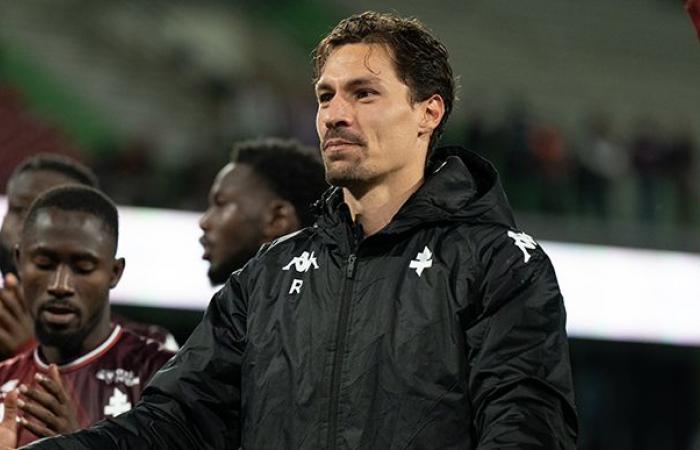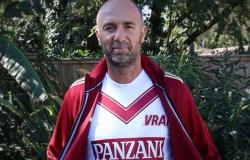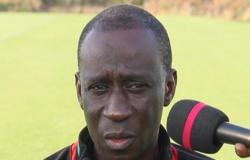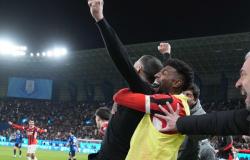
What kind of little boy were you?
I was a fairly active little boy, I could spend hours outside with a ball. I have always been passionate and fascinated by Football. Initially, I wanted to be a goalkeeper and then things evolved. I watched a lot of match tapes, I analyzed everything, I always wanted to know more. When I was very young, I also went to the training sessions of my older brother, three years older than me. Then, I ended up putting on my first crampons at the age of 4 and I never let them go again. I started at Olympique de Marseille, then played in Uzès, in Gard. Subsequently, I followed the transfers of my father, coach, Henri Stambouli, so I traveled around quite a bit. I spent some time in Sion, in Switzerland, then at CS Sedan Ardennes. After a brief return to ESGC Uzès, I joined the pre-training center and then the Montpellier HSC training center. At the same time, I was quite conscientious at school, I would even say that I was a good student! My education has always been very important to my parents.
You grew up in a family environment nourished by high-level football, what are your family meals like?
Contrary to what one might think, we weren't just talking about football. We are a family of epicureans, fortunately we had other topics of conversation! Afterwards, of course, the subject kept coming back to the table. Of course, during our time together, we talked about football. I often tell this anecdote. But it is true that as the meal progressed, salt and pepper became central defenders. They were used to present tactical diagrams. My mother and grandmother willingly participated in the discussions. Everyone had their anecdote to tell (laughs), and honestly their book of anecdotes seems inexhaustible. I still hear news about it, it's incredible, I don't know how they do it! As a football fan, it's pure happiness! My family still lives in Uzès. When we have the opportunity to get together, most often in the summer, we have a blast.
Has this legacy ever weighed on you?
My family never pushed me to succeed, I never felt pressure from them. But it is true that at one point, I experienced a rather difficult period when I was at the Montpellier HSC training center, when it became serious. It was enough for my father, my grandfather or my uncle to be at a match for me to completely fail. I had the impression that they were going to judge me when they only came to see me having fun. I had several discussions with my loved ones, they clearly told me: if you choose another path, if you become a butcher, we will be just as happy for you. They made me understand that I had no obligation to succeed, that football could remain a simple passion. It took a weight off my shoulders, because unconsciously, when you're fourteen, you don't have the maturity to understand certain things. I felt like I had to succeed, but I really didn't. I always grew up with the label “son of” or “grandson of”, it was sometimes heavy. But today, I see it as a strength.
When did you realize your potential?
When I started, I was very reserved in the field. During my last year as a candidate at the Montpellier HSC training center, I felt that I had no certainty about my future, about a potential trainee contract, I was clearly on hold. Then, it clicked after an exchange with my uncle. I was passionate about football but I was also fascinated by the army. At the time, I dreamed of joining GIGN. I had taken a registration form to join the army, in Nîmes. My uncle came across it. And he told me: if you play football with the spirit of the army, you will see that you will succeed. That's where I changed, I went all in. A month later, I was upgraded with the CFA, then I did my first training with the professionals, at 17 years old. They wanted me to finish the year in Ligue 2, but during my first training session, I was in trouble. It's destiny as they say. I did a very good rehabilitation and ended up signing professionally.
Does this requirement, specific to the army, still guide you today?
Over time, I acquired a certain discipline. I admit that I don't do 100 push-ups every morning (laughs)! Above all, it proved to me that being serious and determined, positive things happen in life. This is what I have tried to cultivate since the beginning of my career, with periods of ups and downs, but always with this background noise that self-sacrifice attracts positives. I also understood that a match is not just prepared the day before, it is built all week.
When you arrived, you said you enjoyed mentoring young players. Why is this role so important to you?
It's part of my personality. I feel like I’m at a point in my career where I can give back. I come from a family of coaches, transmission is something essential to me. I benefited from it, I had the chance to rub shoulders with great players. When I know I can help someone with my words or my behavior, I do it! A piece of advice from Laurent Pionnier comes to mind. I had a very good first European Cup match with Montpellier HSC. The following match, we hosted the Girondins de Bordeaux, for the first championship match. He came to see me before this meeting and he said to me: don't think about the match you had, think about the way you prepared for it. It stuck with me because I kept repeating to myself: I had a good match, I had a good match, everything is going to be fine. His advice got me thinking and helped me greatly.





